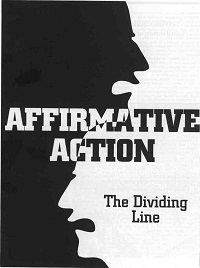
The Department of Justice recently filed suit against Yale University for discriminating against Caucasian and Asian students. It’s going to be just as difficult to prove this discrimination as it is to prove against companies that refuse to hire black or homosexual candidates. This is where government intervention often appears to be a force of good but it really is not. Let me explain.
In a nutshell, the discriminating agency can deny the choice was made because of color of skin, sexual orientation, or any external factor. My father argued a Supreme Court case in the 1960s involving discrimination in housing. He won that case but, and this is important, doing so did not stop white people from preventing blacks moving into their neighborhoods. There are plenty of black people in St. Louis who can affirm the practice is still thriving.
In this case the shoe is on the other foot. Basically, kids from impoverished regions of the country who attend schools without the many academic advantages have no little or no chance to score as well on tests as kids from wealthy school districts, or beat them on the football field. The kids with a huge wealth gap advantage in tutors, trainers, equipment, study material, study time, and other things almost always do better on standardized tests.
Let me make this a little more personal so you can see the point of view of the school. Let’s imagine you are hiring for a position. You have two candidates. One candidate comes from an elite educational environment with all the advantages. The other comes from a poor district with no advantages. Now, you give them both a business-oriented test for which the average score is 50. The elite candidate scores 55 and the poor candidate scores 51. But you look in your database and candidates coming from the elite environment average 64 on the test while those from the poor section average 35. So, you’ve got a candidate who scored 16 points above average for their background and one that scored 9 below from their own. One is clearly an overachiever while the other is an underachiever. Who do you hire?
This is what Yale University and other elite educational schools face everyday when they must choose who to admit. Yale University often chooses the minority student despite having what appears to be a worse academic record. Now, it’s also entirely possible Yale University picks the minority student because the admission counselor hates Asians, but this is difficult to prove. People will always be able to come up with some rational as to why the black family can’t move into the neighborhood besides blatant discrimination. We see it all the time here in St. Louis and I’m sure in your part of the world also.
Now that I’ve explained the problem I’m finally getting to the point of this article. The government cannot fix this problem and often does more harm than good when they try. Let’s imagine the Justice Department is successful in forcing Yale University to admit students based solely on their test scores. Are we not removing the freedom of the school to pick who they want to be members? Is it not their school?
It’s also important to understand it was earlier rulings making discrimination illegal that allow the Justice Department to file this lawsuit against Yale University in the first place. If discrimination was not outlawed by the government, Yale is free to do as it will.
To me that’s the important point. Discrimination didn’t stop because government passed a law. People still speed, people still take drugs, people still discriminate, they just hide it better.
Yale University should be allowed to admit whomever it wants, if they refuse overachieving minority students who will undoubtedly succeed, that’s their loss.
Tom Liberman

